CGIAR, the world’s largest agricultural innovation network, has joined forces with the World Food Programme (WFP) and the Norwegian Agency for Development Cooperation (Norad) under a new project titled, “Learning Support for a Sub-Saharan Africa Multi-Country Climate Resilience Program for Food Security.”
A substantial share of the activities under this partnership will be delivered through the CGIAR Research Initiative on Fragility, Conflict, and Migration (FCM), which now includes a new dedicated work package to coordinate work under this project. The CGIAR Research Initiative Seed Equal is also contributing.
Under this partnership, CGIAR will work with WFP to inform design of its programming, especially that funded by Norad. This support will span programming in at least 14 countries in Africa and cover three pillars:
- Scaling up disaster risk financing
- Transforming the food system through sustainable school meals and clean cooking
- Supporting smallholder farmers to build production and livelihood resilience
As a knowledge partner for Norad and WFP, CGIAR will provide evidence on the effectiveness of interventions and programming addressing each of these pillars, as well as carry out complementary analysis and engage in capacity sharing with WFP and its partners.
This leverages CGIAR’s extensive experience in helping partners design, implement, monitor, and evaluate different types of interventions and investments, including social protection programs, investments in agricultural value chains, and gender-sensitive interventions to address malnutrition and improve the livelihoods and resilience of households and communities.
Within the FCM Initiative, the activities associated with this project are organized across the following four impact areas:
- Strategic support to the WFP program design
- Complementary analysis and development of knowledge products
- Evidence on the impact of the WFP programs through impact evaluation
- Technical and scientific capacity sharing and knowledge exchange
As a first step, CGIAR and WFP have conducted several consultations to identify priorities and programs where additional evidence is needed to inform their design.
Under the second impact area, the FCM team is undertaking strategic evidence reviews, including analyses of climate and conflict risks, anticipatory action initiatives, and how social protection programs can support women’s and girls’ climate resilience in low- and middle-income countries. CGIAR researchers are also conducting country-specific resilience and climate analysis for food security interventions.
Under the third group of work, CGIAR and WFP will conduct rigorous impact evaluations of the WFP interventions aimed at improving nutrition and resilience in crisis settings. These evaluations can help WFP and other humanitarian actors understand how well different programs work and how to target and deliver them better. CGIAR and WFP have identified a significant potential for conducting such evaluations of programs supporting social protection, homegrown school feeding programs, and anticipatory action interventions in several of the focus countries for this project.
Finally, CGIAR and WFP will be working together to share expertise and knowledge. CGIAR local and global experts will collaborate closely with WFP colleagues to organize training sessions, discussions, and skill exchanges. Partners are also collaborating to identify lessons learned and will co-organize events and workshops to share major findings internally and externally.
Overall, the partnership with the WFP, enabled by Norad, is allowing the Fragility, Conflict, and Migration Initiative to cultivate an enduring partnership to promote food security and resilience in some of the most fragile and conflict-affected settings in the world today. It provides a model of how to partner rigorous science with humanitarian assistance and on-the-ground knowledge to improve the lives of the rural poor.
For more information about the CGIAR/WFP/Norad partnership, please reach out to IFPRI Senior Research Fellow Kibrom Abay, Lead of the FCM Initiative Work Package 5, “Learning Support for a Sub-Saharan Africa Multi-Country Climate Resilience Program for Food Security.”
Kibrom Abay is a Senior Research Fellow with IFPRI’s Development Strategies and Governance (DSG) Unit; Katrina Kosec is a Senior Research Fellow with IFPRI’s Poverty, Gender, and Inclusion (PGI) Unit; Evgeniya Anisimova is Media & Digital Engagement Manager with IFPRI’s Communications and Public Affairs Unit. This post first appeared on the CGIAR website.







